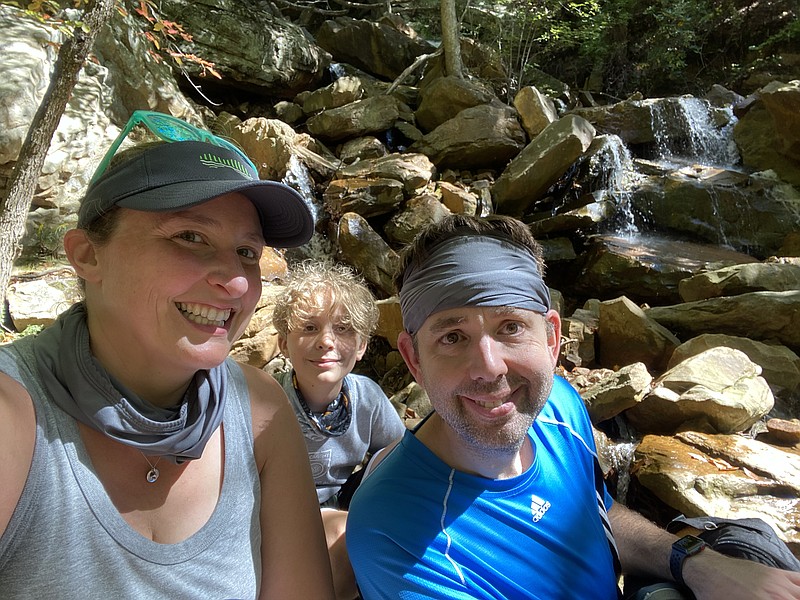By this time in any other year, Chelsea Johnson and her family would probably have been to a few states, maybe even another country, for vacation.
"My family has always made travel a priority," said Johnson, the director of community relations and the BlueCross Foundation at BlueCross BlueShield of Tennessee. " We don't do big birthdays or holidays. We share the memories we make on the road."
When the pandemic hit, the Johnsons paused their vacation plans, unsure when they might be able to get back to traveling. Months of working and schooling from home went by, and suddenly it was summer.
"It was mid-year before we took any time off, and I started realizing - I think everybody had that uh-oh reality that we have now half a year to take a year of vacation," Johnson said.
As the spread of COVID-19 scuttled travel plans and turned homes into makeshift schools and workplaces across the country, unused vacation time has piled up for many people.
In August, a Qualtrics survey of more than 1,100 U.S. workers found that 72% did not take a summer vacation this year. The same survey showed 44% didn't use any time off at all, according to the personal finance website ValuePenguin, which fielded the survey.
At U.S. Xpress, employees used about half the paid time off from March to September of 2020 than they did the previous year, said Ralph Romero, vice president of talent management.
"Especially during the uncertainty of this pandemic, we're encouraging employees to take time for themselves, their families and their overall mental health," he said.
Most employees eligible for paid time off [PTO] lose any time they haven't taken in the calendar year, Romero said.
"Over the past several months, we've reminded employees of our vacation policy and the value of time off through internal communications, various trainings and town halls with our executive leadership," he said.
Lindsay Killian, director of corporate communications at U.S. Xpress, said she canceled a long-planned Disney trip in September that her 4-year-old daughter had been counting down to.
"She's been talking about going to Mickey's house since she could talk," Killian said. "I know that this is such a non-issue in a world full of issues right now, but when it's a 4-year-old, it's hard to explain."
Her family opted instead for a September beach trip, and she'll try to use more vacation time in November and December, Killian said.
"I'm going to take some time off around the holidays - more than I would have," she said.
Dalya Qualls, director of corporate communications for BlueCross, said data earlier in the year showed employees weren't taking as much time off this year as last.
"We noticed early on that PTO usage was lagging and we began to actively encourage our employees to use their [time] to help reduce their stress and recharge their batteries," she said. "It's been a stressful year."
Time off varies at BlueCross, and employees can roll over a maximum of 160 hours, or 20 days, of paid time off each year, Qualls said.
For the Johnsons, the realization that they needed to unplug and recharge led them to explore their hometown. Their 11-year-old son has visited 42 states, but this summer he saw some new local sites, Johnson said.
More Info
In August, a Qualtrics survey of more than 1,100 U.S. workers found that 72% did not take a summer vacation this year. The same survey showed 44% didn’t use any time off at all, according to the personal finance website ValuePenguin, which fielded the survey.
"If we could not travel, we decided we would make the best of staying here and using our vacation time to reconnect with our community and families," she said. "We ended up having some time together hiking and seeing parts of our Tennessee Valley that my 11-year-old hadn't yet been exposed to."
[Read more: Road trips drive hopes for brisk tourism this holiday weekend.]
Patti Harris, human resources manager for Pinnacle Bank, said the deluge of applications for Paycheck Protection Program loans and other government aid through the spring and summer meant people were working nonstop.
"We encouraged our leaders to go out and try to make sure and encourage our teams to try to get away if at all possible," she said. "We do know we're all more productive when we get time away."
The bank also bent its normal use-it-or-lose-it time off rules for people who were working constantly on the forgivable Paycheck Protection Program loans and other pandemic-related needs, Harris said.
"This is a rare occasion," she said. "We allowed carryover for select people. That's been helpful."
Pinnacle typically offers three to five weeks of paid time off a year, and employees can give away unused PTO to their colleagues via a time bank employees can draw from in case they have unanticipated time off and none left on the books. Pinnacle also has a somewhat unconventional approach to its vacation calendar, Harris added.
"Our PTO year ends Sept. 30," she said. "Not to say we don't have a lot of PTO around the holidays, but it's less compounded by not having our PTO year end at the same time."
Contact Mary Fortune at mfortune@timesfreepress.com. Follow her on Twitter @maryfortune.
